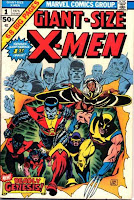In no particular order.
1. Saga of the Swamp Thing #21 "The Anatomy Lesson" By Alan Moore, Steven Bisette, John Tottleben and Rick Veitch.

Alan Moore received critical acclaim and his legendary status in graphic novel writing history with his seminal work "Watchmen," but it all started two years earlier when Moore was called upon to save the struggling "Swamp Thing." Moore's take on the character, that he was a monster masquerading as a man rather than a man who had become a monster, revolutionized mainstream comic books, and set the stage for what was to come.

As Moore was doing his part to change the way people thought about comic books, Frank Miller was contributing in his own way. His saga of Batman at 50 brought Batman back from the freewheeling, camped out version of the 60s and 70s and restored the character to his darker roots, without which hit movies like "Batman Begins" and "The Dark Knight" would never have happened.
3. Watchmen #1 "At Midnight All the Agents..." By Alan Moore and Dave Gibbons

The graphic novel Moore is best known for, and recognized as one of TIME's 100 greatest novels of all time, Moore deconstructed super heroes in Watchmen in a way that had never seen before, but has been often imitated since.
4. Giant Size X-Men #1 "Deadly Genesis!" By Len Wein and Dave Cockrum

5. Sandman #1 "Sleep of the Just" By Neil Gaiman and Sam Kieth

Where Moore started things, Neil Gaiman took over (literally, in the case of another popular Moore book, "Miracleman"). In Sandman, another struggling DC property, Gaiman made a rich mythology all his own, drawing on sources as far ranging as Crowleyan Mysticism and Chinese Legend.

While Len Wein may have reinvented the superteam with the X-Men, Chris Claremont defined it. The pathos of his stories kept readers rapt for years, particulalrly this one, where he was bold enough to kill off a major character who had been beloved for years. In contrast to most comic book deaths, she actually stayed dead for quite some time too.
7. Action Comics #1 "Superman" by Jerry Siegel and Joe Shuster
 This is really the one that started it all. Although there were costumed crusaders before Superman appeared, Siegel and Shuster's creation truly represented the birth of the costumed superhero.
This is really the one that started it all. Although there were costumed crusaders before Superman appeared, Siegel and Shuster's creation truly represented the birth of the costumed superhero.8. Amazing Fantasy #15 "The Amazing Spider-Man" by Stan Lee and Steve Ditko
 While much of the four color world of Superman was cast in black and white, Spiderman was the first hero to live in a world where life was not perfect, and the problems he evaded when he put on his super-suit and fought crime were still there waiting for him when the mask came off.
While much of the four color world of Superman was cast in black and white, Spiderman was the first hero to live in a world where life was not perfect, and the problems he evaded when he put on his super-suit and fought crime were still there waiting for him when the mask came off.9. Detective Comics #27 "The Case of the Chemical Syndicate" by Bill Finger and Bob Kane
 The comic book that spawned a thousand stories, books, T.V. shows and movies, Batman is the archetype of the "human" superhero, one that is pushed to become something better than a mere mortal by circumstance and his own indomitable will.
The comic book that spawned a thousand stories, books, T.V. shows and movies, Batman is the archetype of the "human" superhero, one that is pushed to become something better than a mere mortal by circumstance and his own indomitable will.10. Flash #123 "Flash of Two Worlds" by Gardner Fox and Carmine Infantino

Before the idea of parallel universes became commonplace, the Flash introduced us to the idea of Earth-2, a world that was much like our own, but different in some very significant ways. This concept reshaped the entire D.C. Universe, and perhaps the way we look at our own universe as well.
Two final notes: 1, I apologize for my DC bias. I grew up a DC guy, and I'll always be one. 2. I recognize that many people go into the creation of these books, including inkers, letterers, and colorists, and I honor and respect their contributions, even if I did not have the room to include all of their names here.